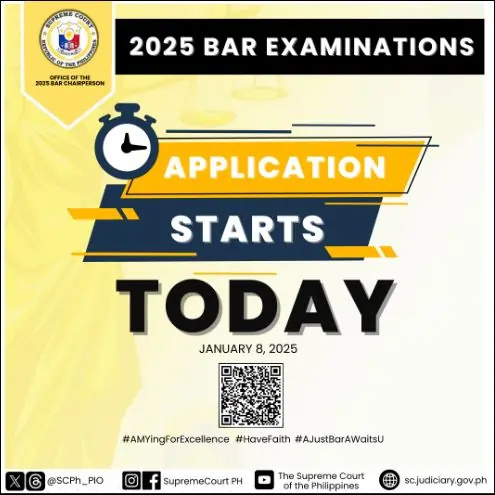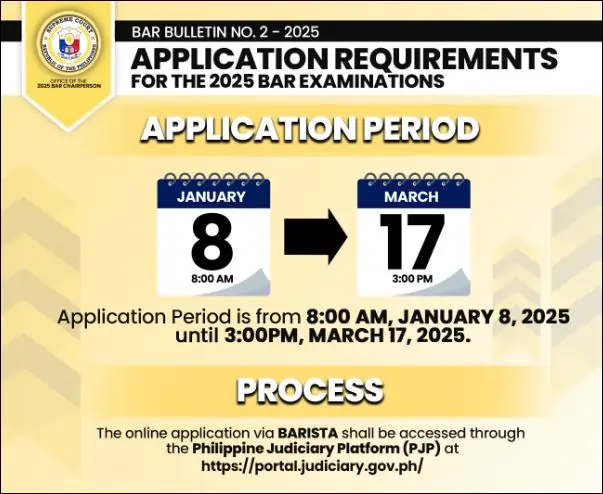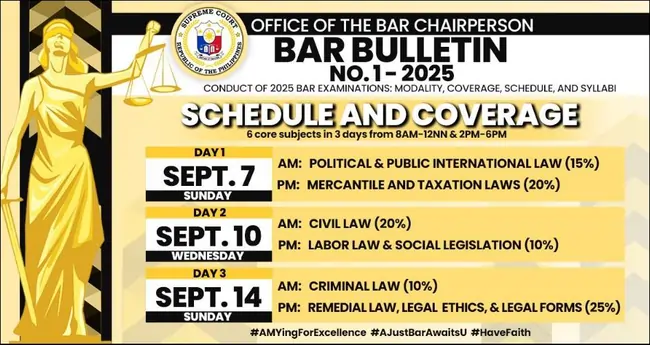The 2025 Philippine Bar Exams are a significant milestone for aspiring lawyers. This guide will help you understand the exam’s schedule, key subjects, and provide tips to help you excel. By preparing strategically, you can set yourself on the path to becoming a licensed lawyer in the Philippines.
Table of Contents

Overview of the 2025 Philippine Bar Exams
The Philippine Bar Exams are a rigorous process designed to assess a law graduate’s readiness to practice law. In 2025, the exams will be conducted by the Supreme Court of the Philippines. It’s essential for candidates to understand the structure of the exam and how to approach their preparation.
The 2025 Philippine Bar Exams will focus on fundamental legal knowledge expected of law professionals. The exams are designed to test a candidate’s grasp of core subjects like Political Law, Civil Law, Criminal Law, Labor Law, and more. Understanding the schedule, the coverage, and how to prepare efficiently can make all the difference in your success.

Exam Dates and Schedule
The 2025 Philippine Bar Exams will take place on three key dates in September 2025. These dates are spread over three days, each focusing on different legal topics:
- Day 1 – September 7, 2025
Morning session: Political and Public International Law (15%)
Afternoon session: Mercantile and Taxation Law (20%) - Day 2 – September 10, 2025
Morning session: Civil Law (20%)
Afternoon session: Labor Law and Social Legislation (10%) - Day 3 – September 14, 2025
Morning session: Criminal Law (10%)
Afternoon session: Remedial Law, Legal Ethics, and Legal Forms (25%)


It is crucial to know these dates and the specific subjects for each session to allocate your study time effectively.
Coverage of the Exam
The Philippine Bar Exams will cover six major subjects across three days. Here’s a detailed breakdown of the topics you’ll encounter:
- Political and Public International Law: Covers the Constitution, human rights, international agreements, and government structures.
- Mercantile and Taxation Law: Focuses on business law, contracts, taxes, and corporate structures.
- Civil Law: Deals with property rights, family law, contracts, and other legal obligations.
- Labor Law and Social Legislation: Addresses worker rights, employment law, and labor relations.
- Criminal Law: Focuses on crimes, criminal procedures, and penalties.
- Remedial Law, Legal Ethics, and Legal Forms: Covers procedural laws, court practices, and ethics required in the legal profession.
Preparation Tips for Success


Proper preparation is key to passing the Philippine Bar Exams. Here are some actionable tips to help you prepare:
- Understand the Exam Format: Familiarize yourself with the structure of the exam, including the number of questions and the weight of each subject.
- Create a Study Schedule: Allocate specific study times for each subject. Prioritize subjects that you find more challenging.
- Use Past Philippine Bar Exams Papers: Reviewing past exams will help you understand the type of questions asked and the level of detail expected.
- Join Study Groups: Collaborating with other bar exam takers can provide valuable insights and different perspectives.
- Focus on Legal Ethics: The Philippine Bar Exams puts significant weight on legal ethics, so it’s essential to be thorough in this area.
- Practice Time Management: During the exam, time is limited. Practice answering questions under timed conditions to improve your speed.
Common Challenges and How to Overcome Them
Many Bar Exam takers face challenges during their preparation, but with the right strategies, you can overcome them:
- Time Management Stress: Many candidates feel overwhelmed by the vast amount of material. Break down your study schedule into manageable parts and stick to your plan.
- Overcoming Procrastination: Start early to avoid last-minute cramming. Consistency is key to retaining information.
- Exam Day Nerves: On the day of the exam, ensure you get enough rest and have all the materials you need, such as identification and exam documents.
Conclusion
7. What are the key challenges that bar examinees face?
Preparing for the Philippine Bar Exam comes with its own set of challenges, many of which test a candidate’s endurance, discipline, and mental resilience. Some of the most significant obstacles include:
- Time Management
Bar examinees often struggle with balancing study commitments and personal responsibilities. Many candidates are working or juggling family obligations, making it difficult to dedicate enough time to prepare for the Bar Exam. Efficient time management becomes crucial, and creating a study schedule that accommodates all necessary subjects can help avoid burnout and ensure consistent progress.- Stress and Anxiety
The pressure to pass the Bar Exam can cause significant stress and anxiety. Exam nerves are common, with some candidates feeling overwhelmed by the scale of the task ahead. These emotions can affect performance, particularly when facing difficult questions or when time is running short. Learning how to manage stress through relaxation techniques or seeking support from peers and mentors can significantly improve both mental health and exam performance.- Volume of Material
The Philippine Bar Exam covers a wide range of subjects, from Political Law to Legal Ethics, and the amount of material to study can feel insurmountable. The complexity of legal doctrines and the volume of case law candidates must familiarize themselves with can be overwhelming. Efficient study strategies—such as breaking down topics into smaller, manageable chunks—can help improve retention and understanding.- Exam Format and Question Style
Unlike other exams, the Philippine Bar Exam uses essay-type questions that require examinees to not only recall legal principles but also apply them to specific scenarios. Crafting well-structured, legal arguments under time pressure can be a significant challenge. Many examinees struggle to write answers that are clear, concise, and legally sound in such a high-pressure environment.- Maintaining Motivation
The months of preparation for the Bar Exam can lead to fatigue and loss of motivation. Many examinees face moments of doubt about their progress, especially when they see their peers progressing at different rates. To maintain motivation, it is essential to set small, achievable goals, celebrate milestones, and remember why you started the journey in the first place.- Logistical Challenges
On exam day, candidates may face logistical difficulties, such as transportation issues or long waiting times at the exam venues. These external stresses can affect an examinee’s mental state, especially when they have to focus on staying calm while managing the logistical pressures of the exam. Being prepared for these circumstances by planning ahead can help mitigate such issues.- Financial Strain
The cost of preparing for the Bar Exam, including Bar review courses, study materials, and exam fees, can place a heavy financial burden on examinees. For some, this can add to the stress of the already demanding preparation process. Proper financial planning, including saving in advance or exploring sponsorships and discounts, can ease the strain.
Frequently Asked Questions (FAQs)
1. When is the 2025 Philippine Bar Exam?
The 2025 Philippine Bar Exams are scheduled for September 7, 10, and 14, 2025. The exams will be held in three separate sessions, each focusing on specific legal subjects. The exact schedule may change, so it is essential to stay updated through official announcements from the Supreme Court of the Philippines.
2.What are the main subjects for the 2025 Philippine Bar Exams?
The 2025 Philippine Bar Exams will cover six main subjects across three days:
- Day 1: Political and Public International Law, Mercantile and Taxation Law
- Day 2: Civil Law, Labor Law, and Social Legislation
- Day 3: Criminal Law, Remedial Law, Legal Ethics, and Legal Forms
These subjects are weighted differently, with Remedial Law and Legal Ethics holding more significance. Make sure to prioritize these areas in your study schedule.
3. How can I prepare for the 2025 Philippine Bar Exams?
To prepare for the 2025 Philippine Bar Exam, consider the following:
- Understand the exam format: The exam consists of essay-type questions. Practice writing clear, concise legal responses.
- Create a study plan: Set aside time for each subject, focusing more on the areas where you feel less confident.
- Review past exams: Past bar exam papers help familiarize you with the types of questions and their complexity.
- Join a bar review course: Enroll in review programs offered by various institutions across the country. They provide structured guidance and offer practice exams.
- Maintain a balanced lifestyle: Ensure proper sleep, nutrition, and physical activity. Staying mentally and physically healthy is crucial for optimal performance.
4. When will the results of the 2025 Bar Exam be released?
The results of the 2025 Philippine Bar Exam will typically be released within four months after the exams. Based on the usual timeline, results are expected to be out by January 13, 2026. Once released, those who passed will be invited to take their oath as lawyers.
5. How do I apply for the Bar Exams in 2025?
The application process for the 2025 Philippine Bar Exams will be announced closer to the exam period. Applicants must meet certain eligibility criteria, such as completing their law degree and passing the required preliminary examinations. Always refer to the official Bar Bulletin and Supreme Court announcements for the most current application guidelines.
6. Where will the 2025 Bar Exams be held?
The 2025 Bar Exams will be held in multiple exam centers across the Philippines, including major cities like Manila, Cebu, and Davao. The Supreme Court will announce the specific testing venues in the lead-up to the exam dates. Keep an eye on official updates to confirm your designated center.
7. What are the key challenges that bar examinees face?
Many examinees face challenges during their Bar Exam preparation. These include:
- Time management: Balancing work, study, and personal responsibilities can be tough. It’s important to create a realistic schedule and stick to it.
- Dealing with exam anxiety: Many candidates experience nervousness before the exam. Practice under exam conditions and mentally prepare to boost your confidence.
- Maintaining motivation: Long study sessions can lead to burnout. Keep yourself motivated by joining study groups, participating in review sessions, and maintaining a balanced study routine.
Disclaimer
This guide is designed to provide general information about the 2025 Philippine Bar Exams. The details provided are based on the latest available information as of January 2025. However, please note that the official schedule, exam topics, and guidelines may be subject to changes issued by the Supreme Court of the Philippines.
It is important to stay updated with official announcements directly from the Supreme Court, including through their website, Bar Bulletin, or official social media channels. Always rely on official sources for the most accurate and timely information regarding the Bar Exams.
For detailed and official updates, please refer to the Supreme Court of the Philippines website or their official social media pages on Facebook, Instagram, X (Twitter), and Viber
TechWirings does not endorse or explicitly support any views or actions expressed in this content.










